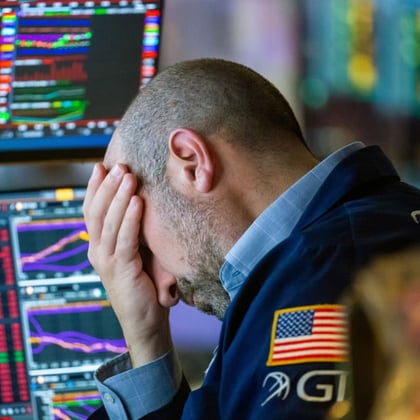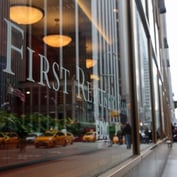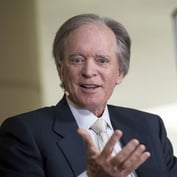Fears that failures at U.S. regional lenders including Silicon Valley Bank could portend a much bigger issue are sweeping across the globe, prompting Wall Street traders to seek shelter in the options market.
The Cboe Volatility Index, a gauge of options cost tied to the S&P 500 known as VIX, jumped Monday to briefly exceed 30 for the first time since last October, while the equity measure sank as much as 1.4% before paring.
Normally, VIX futures contracts are more expensive the further down the horizon. Now, traders are betting on more turbulence in the short term than they are three months ahead, making it more expensive to trade near-dated contracts.
The VIX curve inverted Monday by the most in almost a year, with the spot price ahead of three-month futures.
“When you come in to work and you have stocks that are down 70, 80%, that’s what volatility likes. That’s what reprices volatility higher,” Amy Wu Silverman, head of derivatives strategy at RBC Capital Markets, said on Bloomberg Television. “People are really taking an interest because something that is more of an unknown has hit this market and is starting to price through.”

While such a setup is sometimes viewed as a positive sign for those hoping that markets will soon calm down, it highlights the extreme angst facing investors who worry that lending standards will tighten and the economy may slip into a recession soon.
Shares of regional banks kept bleeding even after authorities introduced a new backstop for lenders that Federal Reserve officials said was big enough to protect the entire nation’s deposits.
“What I’m concerned about is whether we are entering a period of much tighter lending standards because that’s what will affect the underlying economy,” Michael Shaoul, chief executive officer at Marketfield Asset Management, said on Bloomberg Television. “The lesson from the last week is shareholders and bond holders lost everything,” he added. “Your bond holders are going be screaming at you, ‘don’t you dare turn me into Silicon Valley.’ You are going to have to run a much, much more conservative bank.”








 March 13, 2023 at 11:29 AM
March 13, 2023 at 11:29 AM












 Copyright © 2024 ALM Global, LLC. All Rights Reserved.
Copyright © 2024 ALM Global, LLC. All Rights Reserved.